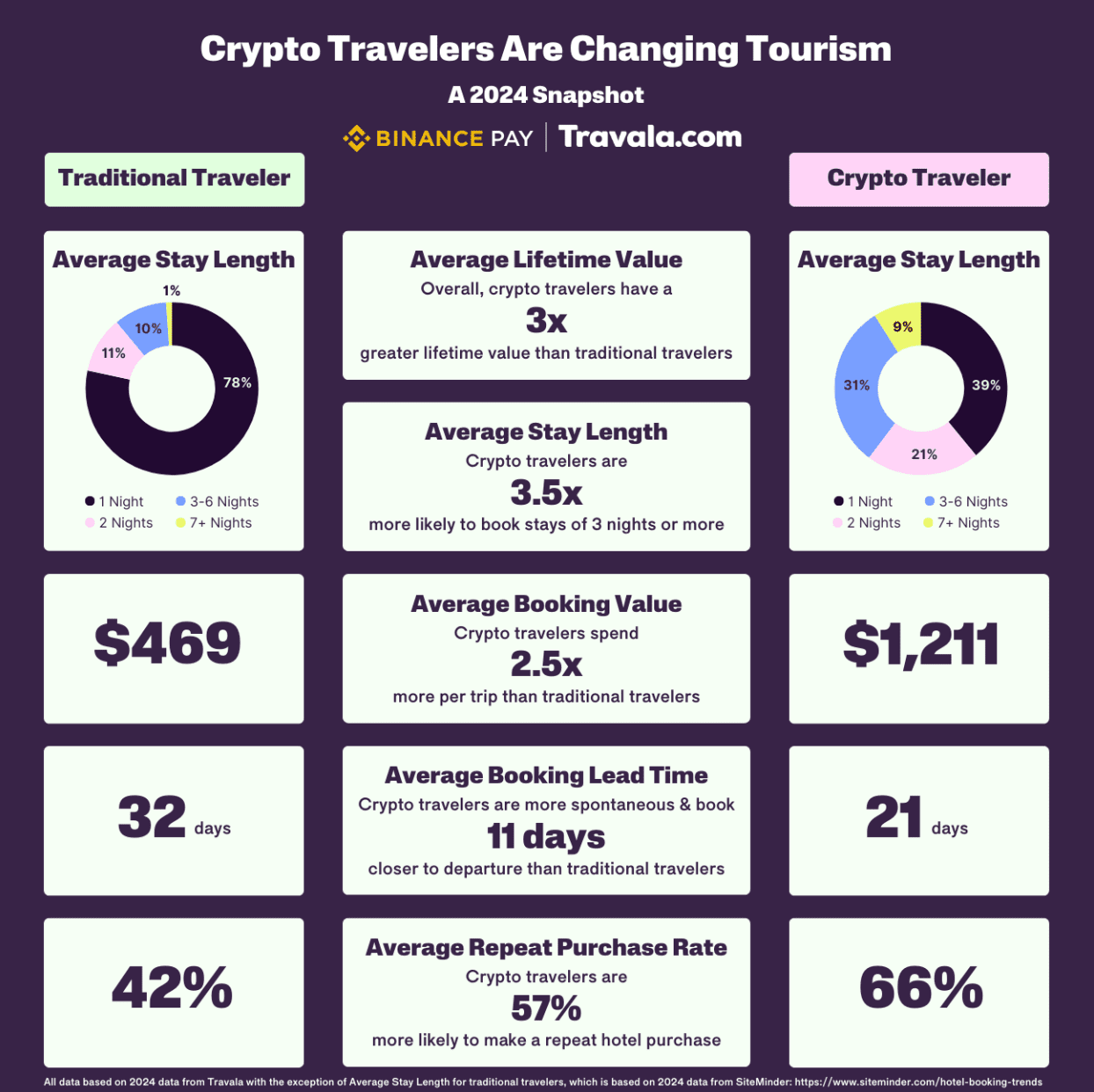The Rise of the Crypto Traveler
A recent report from Binance Pay and Travala reveals that travelers using cryptocurrency for booking arrangements spend significantly more than those using fiat money. This trend highlights the growing influence of crypto in the travel sector, driven by the convenience and borderless nature of digital currencies.
Key Findings:
- Increased Spending: Crypto-based bookings on Travala reached $80 million in 2024, a substantial increase from $45 million the previous year.
- Higher Transaction Values: Crypto travelers spend an average of $1,211 per transaction, more than 2.5 times the $469 spent by fiat users.
- Lifetime Value: Crypto users are three times more valuable over their lifetime due to longer stays and higher repeat bookings, with a 57% higher likelihood of repeat hotel purchases.

Why Crypto Travelers Spend More
Juan Otero, CEO of Travala, attributes these travel preferences to the flexible nature of Web3 jobs. Many crypto users work in the digital asset industry or have remote work lifestyles, making them more likely to travel frequently and stay in one place for longer. They also seek out destinations that support seamless, global payments.
The Benefits of Crypto for Travel
Jonathan Lim, the global head of Binance Pay, emphasizes the borderless utility of crypto for travel. Travelers can bypass currency exchange lines, avoid foreign transaction fees, and instantly pay using their existing digital assets.
Crypto Adoption in the Travel Sector
The integration of digital currencies into airline booking systems has led to a 40% boost in bookings. Travel and hospitality accounted for 14% of all crypto transactions in 2024, according to a report by Triple-A.
The Growth of Crypto Ownership
Triple-A’s report indicates a compound annual growth rate of 99% in cryptocurrency ownership, outpacing traditional payment methods. Among crypto owners, 65% are interested in using it for payments, signaling further adoption in various sectors.
Travala: A Pioneer in Crypto Travel
Founded in 2017, Travala is a leading crypto-native travel platform that allows users to pay for flights, hotel stays, and tours with 141 different cryptocurrencies, including Bitcoin (BTC) and USDC via Binance Pay.
Expanding Crypto Payments Beyond Travel
The use of crypto for payments is expanding beyond travel into various retail sectors, including high-end goods and fast food. The first real-world Bitcoin transaction occurred on May 22, 2010, when 10,000 BTC were used to purchase two pizzas, now celebrated as Bitcoin Pizza Day.

Crypto Payments in Retail
Early adopters of crypto payments in retail targeted high-income consumers. Fashion brand Philipp Plein, Gucci, luxury watchmakers Franck Muller and Norgain, and high-end car dealerships were among the first to accept crypto.
As crypto ownership expands, more retailers are beginning to accept digital currencies for everyday transactions. Recently, American fast-food outlet Steak ’n Shake started accepting Bitcoin as payment. However, challenges such as network fees and confirmation times can impact the user experience.
The Role of Stablecoins
Most crypto travel payments on Travala are made using stablecoins like Tether’s USDT and Circle’s USDC. Binance Pay transactions are ultimately converted into fiat at the point of sale by the merchant or payment partner based on a predetermined exchange rate.
The Future of Crypto Payments
As the crypto landscape evolves, advancements like the Lightning Network and off-chain solutions like Binance Pay are addressing the challenges of transaction speed and fees. The increasing adoption of crypto for travel and retail payments signals a shift towards a more seamless, global, and efficient payment ecosystem.
Conclusion
Crypto travelers are not only spending more but also demonstrating greater loyalty and booking frequency. The integration of crypto payments into the travel and retail sectors offers numerous benefits, including reduced fees, faster transactions, and access to a global customer base. As the crypto ecosystem matures, its role in shaping the future of payments will continue to grow.